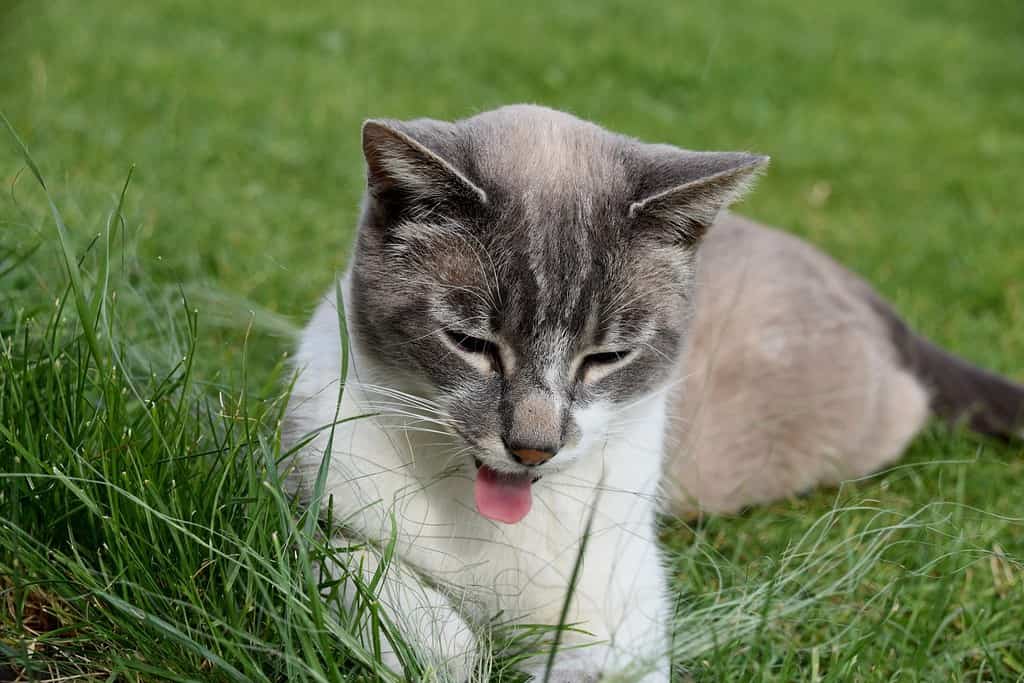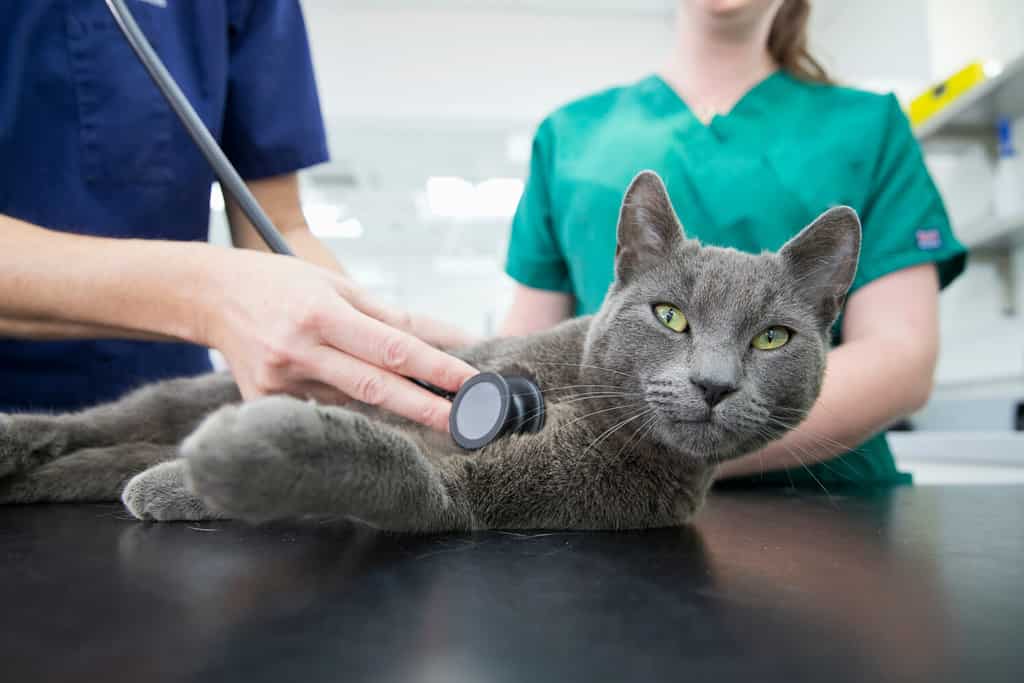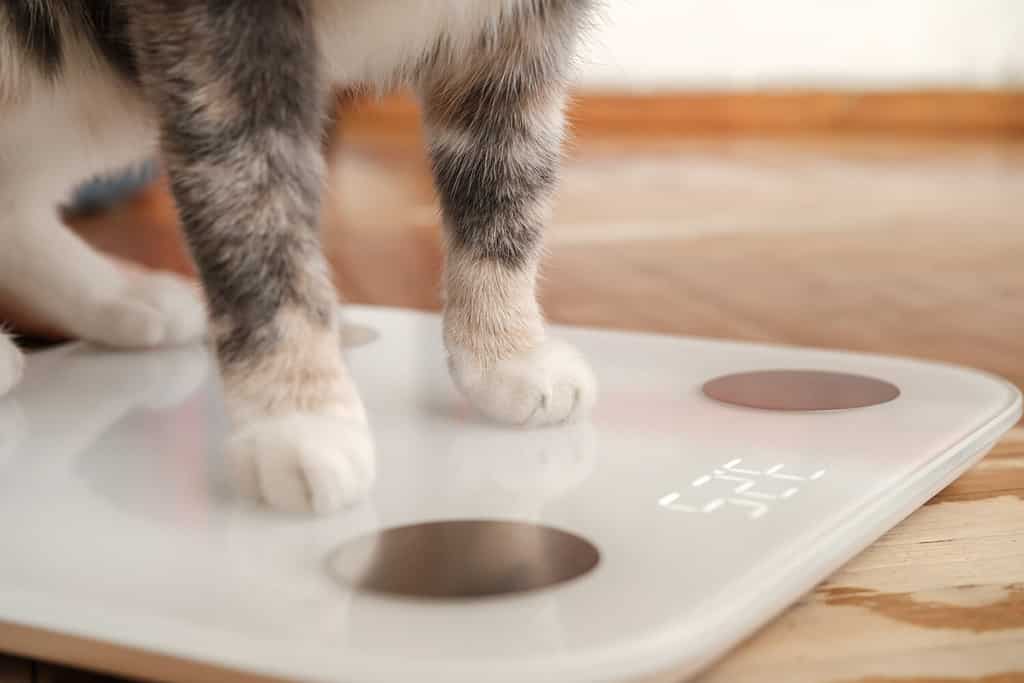You’re a fantastic cat owner, noticing all of your cat’s subtle changes. They’re creatures of habit, after all. They make it easy for you to notice when something is off. But there are some symptoms that seem to appear out of nowhere and can send you down an internet black hole. Before you freak out, discover why your cat is breathing so fast and if you should be worried!
12 Reasons Cats Breathe Fast
1. Stress and Anxiety
If your cat is under a lot of stress or feeling especially anxious, they may breathe fast. There are various reasons why your cat may be overwhelmed and stressed. It could be something as mundane as the sound of a lawn mower in your yard, but cats get stressed for a range of reasons, including car rides, new home environments, or new pets and humans in the environment. Generally, this subsides after your cat regulates but if the fast breathing continues, it could be due to another condition.
Generally, cats also have other symptoms when they’re anxious. They may get destructive, scratching away at furniture they know not to touch. They could start zooming around, trying to rid themselves of the anxiety. But they may also get reclusive, hiding in the deepest, darkest corner they can find. When the stressor is no longer present, your kitty may relax. But in some cases, like with chronic anxiety, you may need to take other measures. This may include training, prescription medication, or even CBD for cats!

A stressed out cat may breathe quickly; however, when the stressor is not present, they relax.
©Georges Hanna/Shutterstock.com
2. Allergies
It could be that your cat is having an allergic reaction or that your cat suffers from seasonal allergies. If you know your cat suffers from allergies, administer a vet-approved medication like an antihistamine. However, if this is new and unusual behavior for your cat, contact your veterinarian to determine possible treatment options.
3. Obstruction
An obstruction occurs when there is some kind of foreign object (or even mucus) in your cat’s airway. Their breathing sounds a bit ragged at times and can be quite rapid. It could also sound like your cat is wheezing. If your cat has ingested a foreign object and isn’t able to expel it on their own, this is a serious condition that requires veterinary care immediately. In some cases, your cat may require emergency surgery to remove the foreign object. Ultimately, you can’t know what’s next until your veterinarian has conducted a thorough evaluation, including x-rays.
4. Exertion
Just like you huff and puff after a particularly strenuous workout, your cat also breathes hard after exertion! If you notice your cat breathing heavily after a vigorous play session with a new feather toy or with another pet, they may just be tired from all the excitement. Typically, they’re able to calm down after breathing hard for a little bit. However, if the rapid breathing continues even after your cat has had time to rest, there could be something else going on.
5. Heart Disease
Abnormal breathing could also be a more serious condition. For example, if your cat has developed a heart condition, you may notice that their breathing is a lot faster and labored. However, heart issues like congestive heart failure may not even present with symptoms! Your cat may be acting completely normal, or you may notice labored breathing. This is why it’s so important to keep up with your annual check-ins at the vet to ensure they are as healthy as can be.

Regular vet checkups help you stay proactive in regard to your cat’s overall health.
©Juice Flair/Shutterstock.com
6. Fever
If your cat has a fever, rapid breathing may also be a symptom. As their body temperature elevates, they start to pant in an attempt to regulate their body temperature. Sometimes, this symptom is audible, and you may hear wheezing sounds. However, on other occasions, your cat’s rapid breathing may only be noticeable if you watch their chest. Either way, a fever is a sign of infection or disease that requires medical attention.
7. Poisoning
Another reason your cat may be breathing rapidly is poisoning. If you suspect your cat may have ingested a poisonous substance, contact your veterinarian right away. Meanwhile, you can attempt to provide them with water but avoid trying to get them to vomit as this could make the situation worse. When a cat has ingested something poisonous, other symptoms may be present, including diarrhea, drooling, and a sluggish disposition. They may also walk uncharacteristically and may even experience a seizure.
8. Respiratory Infection
If your kitty has developed a respiratory infection, this could also result in fast breathing. Often, when a respiratory infection manifests, it starts as a viral infection. However, it may develop further. Be sure to consult your veterinarian to determine the best course of care. Usually, antibiotics help to clear the infection, which results in a major relief for your feline friend. If you’re concerned about your cat’s gut flora when taking antibiotics, ask your vet about probiotics you can administer to help restore the good bacteria in their gut!
9. Obesity
Has your cat been eating one too many extra treats? If you know your cat is overweight, it’s best to put them on a diet plan to help reduce the extra weight they’re carrying, help them breathe a little easier, and improve their health overall. Studies show that cats who are obese have an increased risk of developing a range of diseases, including respiratory diseases. By helping them lose a bit of weight, you move them out of the higher-risk category.

Keeping your cat at a healthy weight promotes good health and reduces their chances of developing a host of chronic diseases, including diabetes.
©Koldunov Alexey/Shutterstock.com
10. Asthma
Asthma can develop suddenly or can be a long-term condition your kitty has to grapple with. Rapid breathing occurs when your cat is having an asthma attack. There are various environmental triggers that can either set off asthma or aggravate an asthma attack. Sometimes, it’s an obvious culprit like pollen or tobacco smoke. But other times, your cat’s own litter can trigger an attack! Speak with your veterinarian if you suspect your cat has developed asthma. Treatment may be two-fold, including both corticosteroids and bronchodilators. However, your vet will make that determination.
11. Lung Disease
Sometimes lung conditions are the cause of rapid breathing. If there’s a tumor present in one of your cat’s lungs or they’ve been dealing with an illness that has escalated to pneumonia, rapid breathing may be a symptom. Lung diseases require immediate veterinary care.
12. Metabolic Disorders
Even something like a metabolic disorder can cause your kitty to breathe faster than usual. For instance, if your cat has diabetes that is out of control, one of the symptoms may be rapid breathing. If a cat has developed diabetes, you may need to administer injectable insulin to reduce blood sugar.
When You Should Worry
Respiratory distress in your cat may send you into a spin, and you may start exhibiting the same symptoms! But the best thing you can do when you notice your cat breathing rapidly is to keep your wits about you. Did they get the zoomies and are just catching their breath? This should subside soon. But if the rapid breathing persists, reach out to your veterinarian (or 24/7 animal hospital if it’s after-hours). They’re going to ask what your cat was up to before the event.
When you’re able to provide a timeline, this can help your vet narrow down potential causes. Even before something like this happens, put an emergency care plan together for your cat. Know where your nearest 24/7 animal hospital is in case your primary care vet is unavailable. Look for urgent care offices in the area as well. Have the numbers saved in your phone and have your cat carrier somewhere easily accessible. By putting an emergency care plan together, you do your future self a major favor!
The photo featured at the top of this post is © K64End/Shutterstock.com
Thank you for reading! Have some feedback for us? Contact the AZ Animals editorial team.







